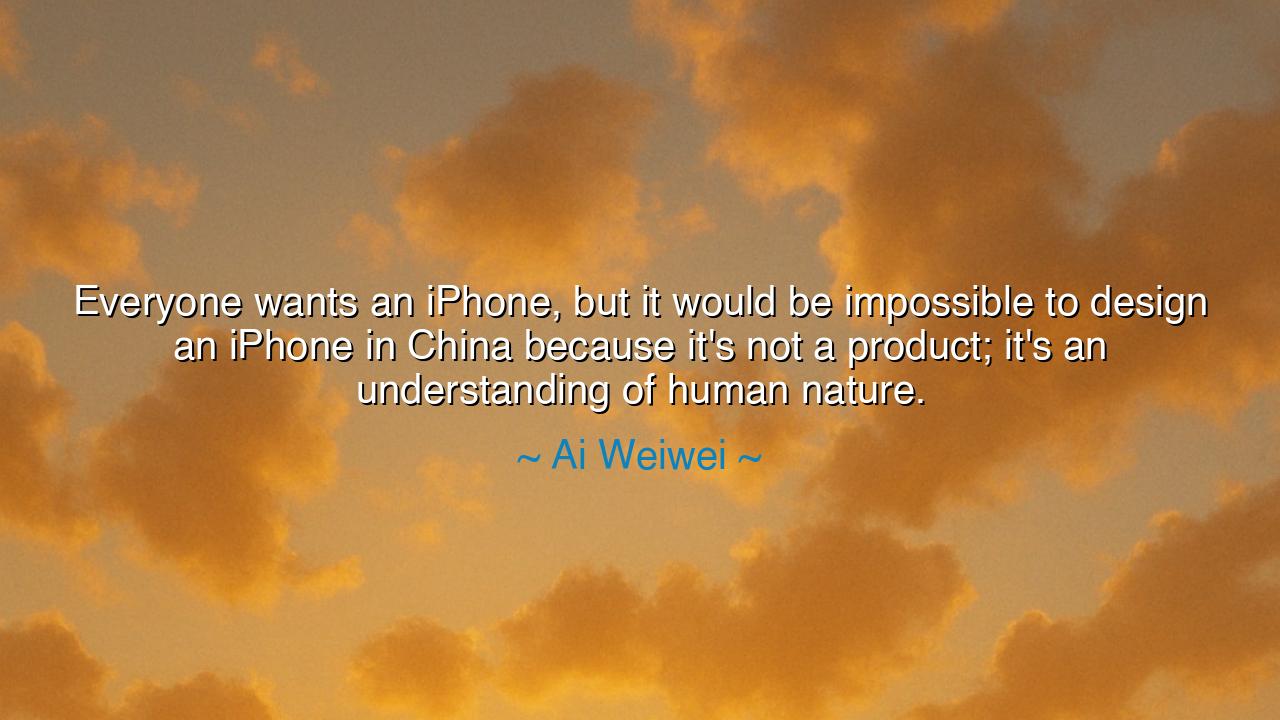
Everyone wants an iPhone, but it would be impossible to design an
Everyone wants an iPhone, but it would be impossible to design an iPhone in China because it's not a product; it's an understanding of human nature.






When Ai Weiwei declared, “Everyone wants an iPhone, but it would be impossible to design an iPhone in China because it's not a product; it's an understanding of human nature,” he spoke with the clarity of a philosopher observing the currents of culture and creation. His words pierce beyond the realm of commerce and technology into the heart of human desire. Ai reminds us that great design is not merely the assembly of materials, circuits, or glass — it is the manifestation of empathy, the crystallization of insight into the minds, habits, and aspirations of people. The iPhone, he implies, is less a product than a mirror of human psychology, a testament to understanding what people truly want before they even know it themselves.
The origin of this thought lies in Ai Weiwei’s dual mastery of art and activism. Having spent decades critiquing societal structures, he perceives both the mechanics of industry and the subtle currents of human behavior. In comparing the iPhone’s design process to the limitations of production in China, Ai emphasizes a profound truth: that creation requires more than labor or technology; it requires comprehension of human nature itself. The iPhone is successful not solely because of its precision, but because it anticipates how humans interact with the world — the gestures, the intuitions, the longing for simplicity and elegance. To craft such a device demands insight, not just engineering.
His words echo a timeless principle: that the deepest art imitates life, and the most lasting invention resonates with the human soul. Consider Leonardo da Vinci, who painted the Mona Lisa not only as a portrait but as an exploration of emotion, subtlety, and perception. The work’s genius lay not in pigments or brushstrokes alone, but in understanding the human heart, in anticipating the wonder and curiosity of generations to come. Likewise, the iPhone succeeds because it is designed with anticipation of desire, an object that speaks the unspoken needs of its users.
Ai Weiwei’s observation also carries a cautionary undertone. The suggestion that it could not have been created elsewhere reminds us that technical skill is insufficient without cultural and psychological insight. Production alone cannot replace empathy; the capacity to read human behavior, to predict reactions, to design for intuition, is what elevates a product from functional to iconic. History abounds with lessons: empires have fallen not from lack of strength, but from failure to understand the people they ruled; innovations have floundered not from poor craftsmanship, but from a blindness to human expectation.
In this light, the iPhone becomes more than a gadget — it is a lesson in human-centered design. The study of behavior, habits, and desires is inseparable from creation itself. Consider the work of Frank Lloyd Wright, whose architectural designs anticipated the ways people would live, move, and dwell within space. Wright’s genius was in foreseeing not merely physical needs, but the rhythms of life, the patterns of thought, and the subtle joys of existence. Ai Weiwei draws the same parallel: a product that endures must resonate with human nature, not just with technical standards.
Moreover, Ai’s quote challenges us to reconsider how we approach creation in any field. It is not enough to possess tools, resources, or labor; the maker must cultivate insight, curiosity, and empathy. To build meaningfully, one must observe the human condition, sense what is sought subconsciously, and translate that into form. This is the alchemy that transforms matter into experience, technology into intimacy, and objects into icons. The iPhone, in Ai’s view, is a bridge between human nature and human invention, a testament that the greatest creations emerge not from what is possible, but from what is understood.
So, O seeker of wisdom, let this teaching guide your hand: study the human spirit as closely as you study materials and methods. Whether you create art, technology, or solutions for society, let insight into behavior, desire, and need guide your choices. Observe carefully, empathize deeply, and let understanding precede action. For creation that ignores human nature, no matter how precise, will remain hollow; creation that listens to it becomes timeless.
In the end, Ai Weiwei reminds us that products are not merely objects, they are reflections of understanding. To design for human experience is to honor the complexity, subtlety, and yearning that define us. The iPhone succeeds because it listens to the soul before the hand; every gesture, every interface, every curve is a dialogue with human life itself. In this, we find the eternal lesson: true innovation flows from the mind that observes, the heart that understands, and the hand that translates insight into reality.






AAdministratorAdministrator
Welcome, honored guests. Please leave a comment, we will respond soon